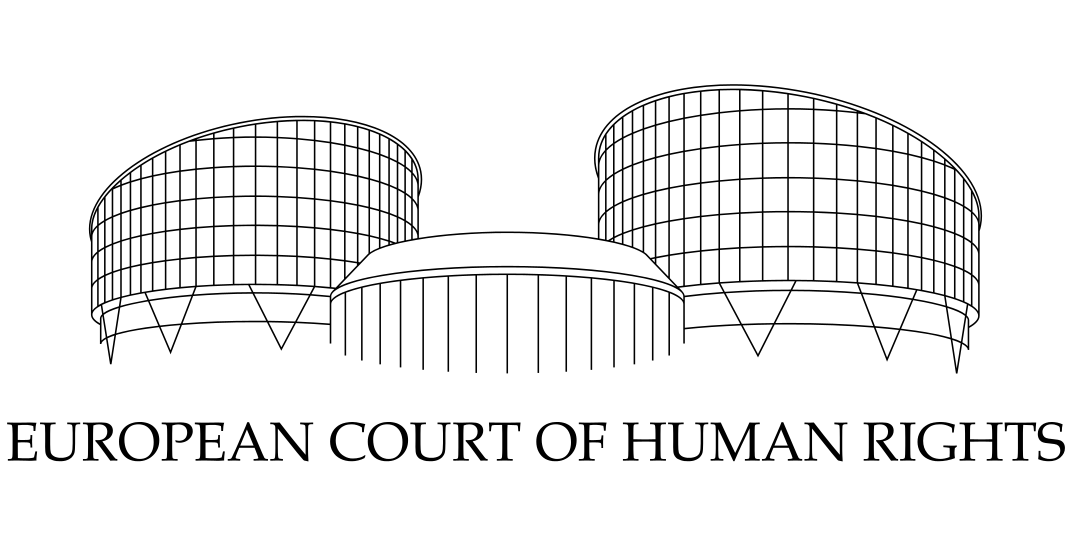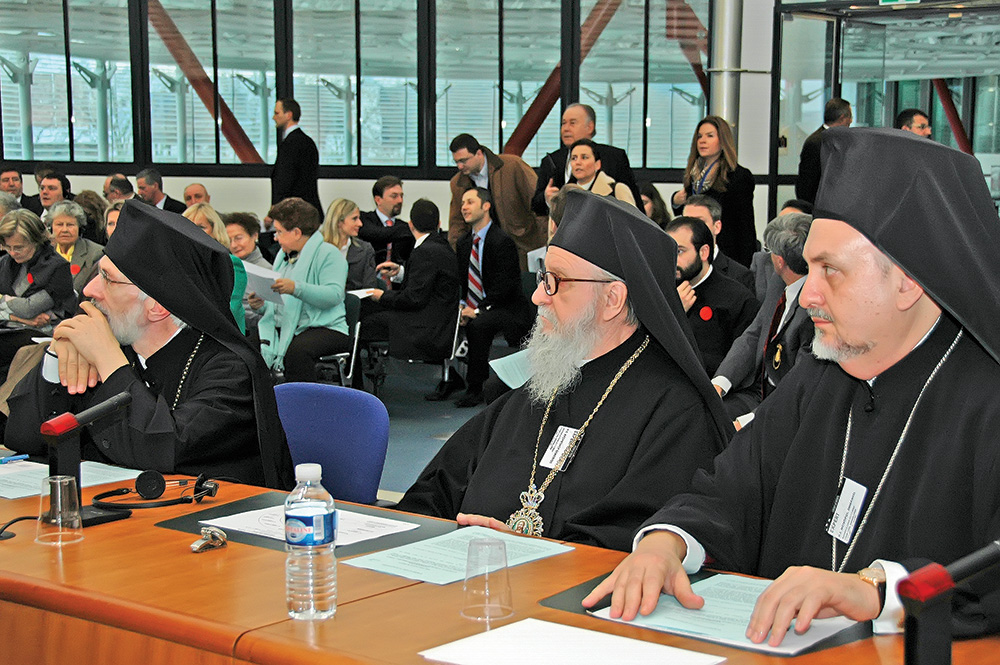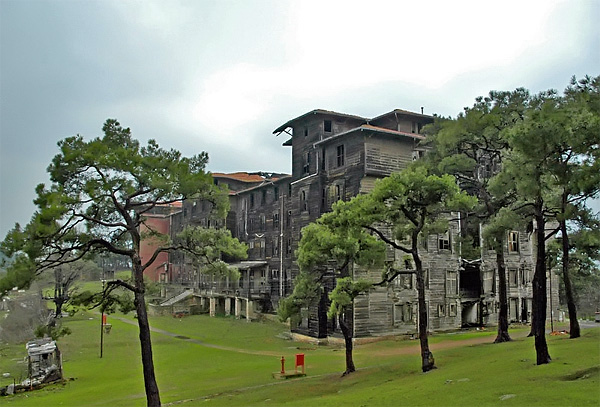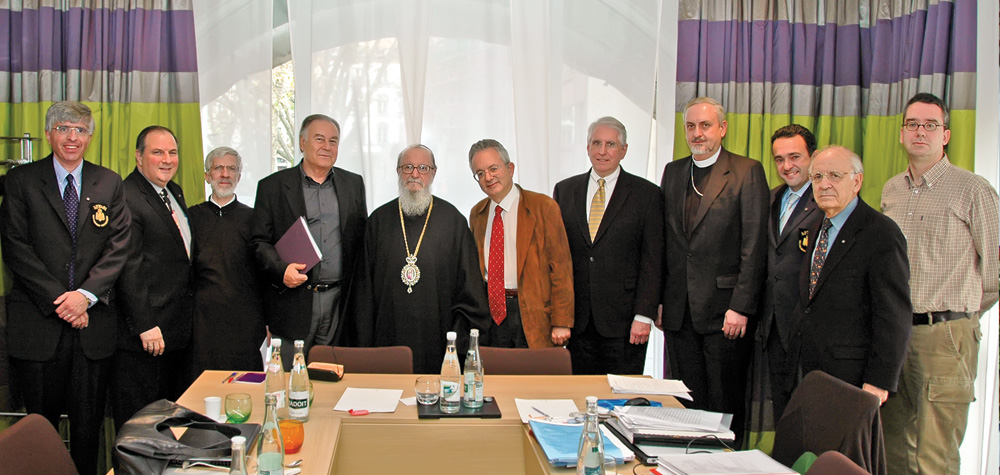Home » Efforts in Europe
European Court of Human Rights
European Court of Human Rights
The significance of the European Court of Human Right’s decision on the Patriarchal Orphanage Confiscation Case
by Archon George C. Rockas, Esq., Legal Committee Member
 On July 8, 2008, the European Court of Human Rights (“ECHR”) issued a landmark decision in the case of Fener Rum Patriarchate (Ecumenical Patriarchate) v. Turkey (“Orphanage Case”) involving the seizure without compensation of an orphanage off the coast of Istanbul by the Government of Turkey (“Government”). That decision by the ECHR has debunked three myths the Government has espoused regarding the Ecumenical Patriarchate. First, the Government has long embraced the view that the Ecumenical Patriarchate lacks “legal personality.” In effect, it maintains the view that the Ecumenical Patriarchate does not exist. This would mean that it lacks basic rights, such as the right to own property. Second, the Government has refused to recognize the “Ecumenical” nature of the Ecumenical Patriarchate. At least one Turkish court has even said use of the title “Ecumenical” is a criminal offense. Third, the Government has long maintained that the Greek Orthodox minority in Turkey, including the Ecumenical Patriarchate, is not subject to the Treaty of Lausanne. The ECHR’s decision leaves no doubt that these three myths have no basis in law.
On July 8, 2008, the European Court of Human Rights (“ECHR”) issued a landmark decision in the case of Fener Rum Patriarchate (Ecumenical Patriarchate) v. Turkey (“Orphanage Case”) involving the seizure without compensation of an orphanage off the coast of Istanbul by the Government of Turkey (“Government”). That decision by the ECHR has debunked three myths the Government has espoused regarding the Ecumenical Patriarchate. First, the Government has long embraced the view that the Ecumenical Patriarchate lacks “legal personality.” In effect, it maintains the view that the Ecumenical Patriarchate does not exist. This would mean that it lacks basic rights, such as the right to own property. Second, the Government has refused to recognize the “Ecumenical” nature of the Ecumenical Patriarchate. At least one Turkish court has even said use of the title “Ecumenical” is a criminal offense. Third, the Government has long maintained that the Greek Orthodox minority in Turkey, including the Ecumenical Patriarchate, is not subject to the Treaty of Lausanne. The ECHR’s decision leaves no doubt that these three myths have no basis in law.
 The basic facts of the case are simple. In 1902, the Ecumenical Patriarchate purchased property on the Island of Buyukada (Prinkipos) off the coast of Istanbul which consisted of land containing two buildings, one five stories and the other two stories. The Ecumenical Patriarchate used the buildings for an orphanage. In 1997, the Foundations General Directorate in effect seized the property without compensation. The Ecumenical Patriarchate unsuccessfully instituted legal proceedings in Turkey to recover the property. It then appealed the decision of the Turkish court to the ECHR. That court reversed the decision of the Turkish court, and in so doing, established a number of basic rights of the Ecumenical Patriarchate. Specifically, the court decision debunked (i.e., rejected as false) the three myths described above.
The basic facts of the case are simple. In 1902, the Ecumenical Patriarchate purchased property on the Island of Buyukada (Prinkipos) off the coast of Istanbul which consisted of land containing two buildings, one five stories and the other two stories. The Ecumenical Patriarchate used the buildings for an orphanage. In 1997, the Foundations General Directorate in effect seized the property without compensation. The Ecumenical Patriarchate unsuccessfully instituted legal proceedings in Turkey to recover the property. It then appealed the decision of the Turkish court to the ECHR. That court reversed the decision of the Turkish court, and in so doing, established a number of basic rights of the Ecumenical Patriarchate. Specifically, the court decision debunked (i.e., rejected as false) the three myths described above.
 First, the ECHR held that the Government interfered with the Ecumenical Patriarchate’s right to own property as provided for in Article 1, Protocol 1 of the European Convention on Human Rights. That article provides, in pertinent part, as follows:
Every natural or legal person is entitled to the peaceful enjoyment of his possessions. No one shall be deprived of his possessions except in the public interest and subject to the conditions provided for by law and by the general principles of international law.
First, the ECHR held that the Government interfered with the Ecumenical Patriarchate’s right to own property as provided for in Article 1, Protocol 1 of the European Convention on Human Rights. That article provides, in pertinent part, as follows:
Every natural or legal person is entitled to the peaceful enjoyment of his possessions. No one shall be deprived of his possessions except in the public interest and subject to the conditions provided for by law and by the general principles of international law.
 By so ruling, the ECHR recognized that the Ecumenical Patriarchate can own property. It further indicated that it would award compensation to the Ecumenical Patriarchate if the parties could not agree on a settlement. Perhaps even more important, the ECHR recognized the Ecumenical Patriarchate as a legal entity, something that the Government has long denied. An individual or entity cannot own property if that person or entity has no legal existence. By ruling that the Ecumenical Patriarchate can own property, the ECHR in effect ruled that the Ecumenical Patriarchate is indeed a legal entity entitled to protections under the European Convention on Human Rights.
Second, the ECHR referred to the Complainant as the Ecumenical Patriarchate and described it as “an Orthodox Church in Istanbul having an honorary primate and a role of initiative and coordination throughout the Orthodox world.” The Government has long refused to recognize the “Ecumenical” nature of the Ecumenical Patriarchate, including its leading role in the Orthodox Christian Church throughout the world. Instead, it demeans Ecumenical Patriarch Bartholomew by calling him the “Bishop” of only the 2,000 to 3,000 Greek Orthodox Christians in Istanbul. This contention clearly has been rejected by the ECHR.
Third, at the beginning of the decision, the Court cited relevant internal law and practice, stating:
The provisions of the Treaty of Lausanne (1923) concerning the protection of ancient foundations providing public services for religious minorities state as follows:
Article 37
Turkey undertakes that the stipulations contained in articles 38 to 44 are recognized as fundamental laws, so that no law, regulation or official action shall contradict or conflict with such stipulations and that no law, regulation or official action shall prevail against them.
Article 42 § 3
The Turkish government undertakes to grant full protection to churches, synagogues, cemetries and other minority religious establishments referred to above. Full facilities and authorisation shall be granted to religious foundations and religious and charitable establishments for the same minorities currently existing in Turkey ….
The citing of these provisions clearly establishes that the Ecumenical Patriarchate falls under the protection of the Treaty of Lausanne.
In sum, the decision by the ECHR established the following principles:
By so ruling, the ECHR recognized that the Ecumenical Patriarchate can own property. It further indicated that it would award compensation to the Ecumenical Patriarchate if the parties could not agree on a settlement. Perhaps even more important, the ECHR recognized the Ecumenical Patriarchate as a legal entity, something that the Government has long denied. An individual or entity cannot own property if that person or entity has no legal existence. By ruling that the Ecumenical Patriarchate can own property, the ECHR in effect ruled that the Ecumenical Patriarchate is indeed a legal entity entitled to protections under the European Convention on Human Rights.
Second, the ECHR referred to the Complainant as the Ecumenical Patriarchate and described it as “an Orthodox Church in Istanbul having an honorary primate and a role of initiative and coordination throughout the Orthodox world.” The Government has long refused to recognize the “Ecumenical” nature of the Ecumenical Patriarchate, including its leading role in the Orthodox Christian Church throughout the world. Instead, it demeans Ecumenical Patriarch Bartholomew by calling him the “Bishop” of only the 2,000 to 3,000 Greek Orthodox Christians in Istanbul. This contention clearly has been rejected by the ECHR.
Third, at the beginning of the decision, the Court cited relevant internal law and practice, stating:
The provisions of the Treaty of Lausanne (1923) concerning the protection of ancient foundations providing public services for religious minorities state as follows:
Article 37
Turkey undertakes that the stipulations contained in articles 38 to 44 are recognized as fundamental laws, so that no law, regulation or official action shall contradict or conflict with such stipulations and that no law, regulation or official action shall prevail against them.
Article 42 § 3
The Turkish government undertakes to grant full protection to churches, synagogues, cemetries and other minority religious establishments referred to above. Full facilities and authorisation shall be granted to religious foundations and religious and charitable establishments for the same minorities currently existing in Turkey ….
The citing of these provisions clearly establishes that the Ecumenical Patriarchate falls under the protection of the Treaty of Lausanne.
In sum, the decision by the ECHR established the following principles:
- The Ecumenical Patriarchate can own property and thus has legal personality;
- The Ecumenical Patriarchate can rightfully use the title “Ecumenical” and has a leading role throughout the Orthodox Christian world; and
- The Treaty of Lausanne applies to the Ecumenical Patriarchate, thus providing an additional basis by which the Government must protect the basic human rights of the Ecumenical Patriarchate.
E.U. Rotating Presidency Nation
E.U. Rotating Presidency Nation
 With the blessings of the Exarch, a delegation from the Order of Saint Andrew participate in a Religious Freedom Mission to the European Union in pursuit of human rights and religious freedom for the Ecumenical Patriarchate. During these Missions, they visit with ambassadors, diplomats, religious leaders and dignitaries to further educate the plight of the Ecumenical Patriarchate.
With the blessings of the Exarch, a delegation from the Order of Saint Andrew participate in a Religious Freedom Mission to the European Union in pursuit of human rights and religious freedom for the Ecumenical Patriarchate. During these Missions, they visit with ambassadors, diplomats, religious leaders and dignitaries to further educate the plight of the Ecumenical Patriarchate. European Court of Human Rights
E.U. Rotating Presidency Nation
European Court of Human Rights
European Court of Human Rights
The significance of the European Court of Human Right’s decision on the Patriarchal Orphanage Confiscation Case
by Archon George C. Rockas, Esq., Legal Committee Member
 On July 8, 2008, the European Court of Human Rights (“ECHR”) issued a landmark decision in the case of Fener Rum Patriarchate (Ecumenical Patriarchate) v. Turkey (“Orphanage Case”) involving the seizure without compensation of an orphanage off the coast of Istanbul by the Government of Turkey (“Government”). That decision by the ECHR has debunked three myths the Government has espoused regarding the Ecumenical Patriarchate. First, the Government has long embraced the view that the Ecumenical Patriarchate lacks “legal personality.” In effect, it maintains the view that the Ecumenical Patriarchate does not exist. This would mean that it lacks basic rights, such as the right to own property. Second, the Government has refused to recognize the “Ecumenical” nature of the Ecumenical Patriarchate. At least one Turkish court has even said use of the title “Ecumenical” is a criminal offense. Third, the Government has long maintained that the Greek Orthodox minority in Turkey, including the Ecumenical Patriarchate, is not subject to the Treaty of Lausanne. The ECHR’s decision leaves no doubt that these three myths have no basis in law.
On July 8, 2008, the European Court of Human Rights (“ECHR”) issued a landmark decision in the case of Fener Rum Patriarchate (Ecumenical Patriarchate) v. Turkey (“Orphanage Case”) involving the seizure without compensation of an orphanage off the coast of Istanbul by the Government of Turkey (“Government”). That decision by the ECHR has debunked three myths the Government has espoused regarding the Ecumenical Patriarchate. First, the Government has long embraced the view that the Ecumenical Patriarchate lacks “legal personality.” In effect, it maintains the view that the Ecumenical Patriarchate does not exist. This would mean that it lacks basic rights, such as the right to own property. Second, the Government has refused to recognize the “Ecumenical” nature of the Ecumenical Patriarchate. At least one Turkish court has even said use of the title “Ecumenical” is a criminal offense. Third, the Government has long maintained that the Greek Orthodox minority in Turkey, including the Ecumenical Patriarchate, is not subject to the Treaty of Lausanne. The ECHR’s decision leaves no doubt that these three myths have no basis in law.
 The basic facts of the case are simple. In 1902, the Ecumenical Patriarchate purchased property on the Island of Buyukada (Prinkipos) off the coast of Istanbul which consisted of land containing two buildings, one five stories and the other two stories. The Ecumenical Patriarchate used the buildings for an orphanage. In 1997, the Foundations General Directorate in effect seized the property without compensation. The Ecumenical Patriarchate unsuccessfully instituted legal proceedings in Turkey to recover the property. It then appealed the decision of the Turkish court to the ECHR. That court reversed the decision of the Turkish court, and in so doing, established a number of basic rights of the Ecumenical Patriarchate. Specifically, the court decision debunked (i.e., rejected as false) the three myths described above.
The basic facts of the case are simple. In 1902, the Ecumenical Patriarchate purchased property on the Island of Buyukada (Prinkipos) off the coast of Istanbul which consisted of land containing two buildings, one five stories and the other two stories. The Ecumenical Patriarchate used the buildings for an orphanage. In 1997, the Foundations General Directorate in effect seized the property without compensation. The Ecumenical Patriarchate unsuccessfully instituted legal proceedings in Turkey to recover the property. It then appealed the decision of the Turkish court to the ECHR. That court reversed the decision of the Turkish court, and in so doing, established a number of basic rights of the Ecumenical Patriarchate. Specifically, the court decision debunked (i.e., rejected as false) the three myths described above.
 First, the ECHR held that the Government interfered with the Ecumenical Patriarchate’s right to own property as provided for in Article 1, Protocol 1 of the European Convention on Human Rights. That article provides, in pertinent part, as follows:
Every natural or legal person is entitled to the peaceful enjoyment of his possessions. No one shall be deprived of his possessions except in the public interest and subject to the conditions provided for by law and by the general principles of international law.
First, the ECHR held that the Government interfered with the Ecumenical Patriarchate’s right to own property as provided for in Article 1, Protocol 1 of the European Convention on Human Rights. That article provides, in pertinent part, as follows:
Every natural or legal person is entitled to the peaceful enjoyment of his possessions. No one shall be deprived of his possessions except in the public interest and subject to the conditions provided for by law and by the general principles of international law.
 By so ruling, the ECHR recognized that the Ecumenical Patriarchate can own property. It further indicated that it would award compensation to the Ecumenical Patriarchate if the parties could not agree on a settlement. Perhaps even more important, the ECHR recognized the Ecumenical Patriarchate as a legal entity, something that the Government has long denied. An individual or entity cannot own property if that person or entity has no legal existence. By ruling that the Ecumenical Patriarchate can own property, the ECHR in effect ruled that the Ecumenical Patriarchate is indeed a legal entity entitled to protections under the European Convention on Human Rights.
Second, the ECHR referred to the Complainant as the Ecumenical Patriarchate and described it as “an Orthodox Church in Istanbul having an honorary primate and a role of initiative and coordination throughout the Orthodox world.” The Government has long refused to recognize the “Ecumenical” nature of the Ecumenical Patriarchate, including its leading role in the Orthodox Christian Church throughout the world. Instead, it demeans Ecumenical Patriarch Bartholomew by calling him the “Bishop” of only the 2,000 to 3,000 Greek Orthodox Christians in Istanbul. This contention clearly has been rejected by the ECHR.
Third, at the beginning of the decision, the Court cited relevant internal law and practice, stating:
The provisions of the Treaty of Lausanne (1923) concerning the protection of ancient foundations providing public services for religious minorities state as follows:
Article 37
Turkey undertakes that the stipulations contained in articles 38 to 44 are recognized as fundamental laws, so that no law, regulation or official action shall contradict or conflict with such stipulations and that no law, regulation or official action shall prevail against them.
Article 42 § 3
The Turkish government undertakes to grant full protection to churches, synagogues, cemetries and other minority religious establishments referred to above. Full facilities and authorisation shall be granted to religious foundations and religious and charitable establishments for the same minorities currently existing in Turkey ….
The citing of these provisions clearly establishes that the Ecumenical Patriarchate falls under the protection of the Treaty of Lausanne.
In sum, the decision by the ECHR established the following principles:
By so ruling, the ECHR recognized that the Ecumenical Patriarchate can own property. It further indicated that it would award compensation to the Ecumenical Patriarchate if the parties could not agree on a settlement. Perhaps even more important, the ECHR recognized the Ecumenical Patriarchate as a legal entity, something that the Government has long denied. An individual or entity cannot own property if that person or entity has no legal existence. By ruling that the Ecumenical Patriarchate can own property, the ECHR in effect ruled that the Ecumenical Patriarchate is indeed a legal entity entitled to protections under the European Convention on Human Rights.
Second, the ECHR referred to the Complainant as the Ecumenical Patriarchate and described it as “an Orthodox Church in Istanbul having an honorary primate and a role of initiative and coordination throughout the Orthodox world.” The Government has long refused to recognize the “Ecumenical” nature of the Ecumenical Patriarchate, including its leading role in the Orthodox Christian Church throughout the world. Instead, it demeans Ecumenical Patriarch Bartholomew by calling him the “Bishop” of only the 2,000 to 3,000 Greek Orthodox Christians in Istanbul. This contention clearly has been rejected by the ECHR.
Third, at the beginning of the decision, the Court cited relevant internal law and practice, stating:
The provisions of the Treaty of Lausanne (1923) concerning the protection of ancient foundations providing public services for religious minorities state as follows:
Article 37
Turkey undertakes that the stipulations contained in articles 38 to 44 are recognized as fundamental laws, so that no law, regulation or official action shall contradict or conflict with such stipulations and that no law, regulation or official action shall prevail against them.
Article 42 § 3
The Turkish government undertakes to grant full protection to churches, synagogues, cemetries and other minority religious establishments referred to above. Full facilities and authorisation shall be granted to religious foundations and religious and charitable establishments for the same minorities currently existing in Turkey ….
The citing of these provisions clearly establishes that the Ecumenical Patriarchate falls under the protection of the Treaty of Lausanne.
In sum, the decision by the ECHR established the following principles:
- The Ecumenical Patriarchate can own property and thus has legal personality;
- The Ecumenical Patriarchate can rightfully use the title “Ecumenical” and has a leading role throughout the Orthodox Christian world; and
- The Treaty of Lausanne applies to the Ecumenical Patriarchate, thus providing an additional basis by which the Government must protect the basic human rights of the Ecumenical Patriarchate.
E.U. Rotating Presidency Nation
E.U. Rotating Presidency Nation
 With the blessings of the Exarch, a delegation from the Order of Saint Andrew participate in a Religious Freedom Mission to the European Union in pursuit of human rights and religious freedom for the Ecumenical Patriarchate. During these Missions, they visit with ambassadors, diplomats, religious leaders and dignitaries to further educate the plight of the Ecumenical Patriarchate.
With the blessings of the Exarch, a delegation from the Order of Saint Andrew participate in a Religious Freedom Mission to the European Union in pursuit of human rights and religious freedom for the Ecumenical Patriarchate. During these Missions, they visit with ambassadors, diplomats, religious leaders and dignitaries to further educate the plight of the Ecumenical Patriarchate.